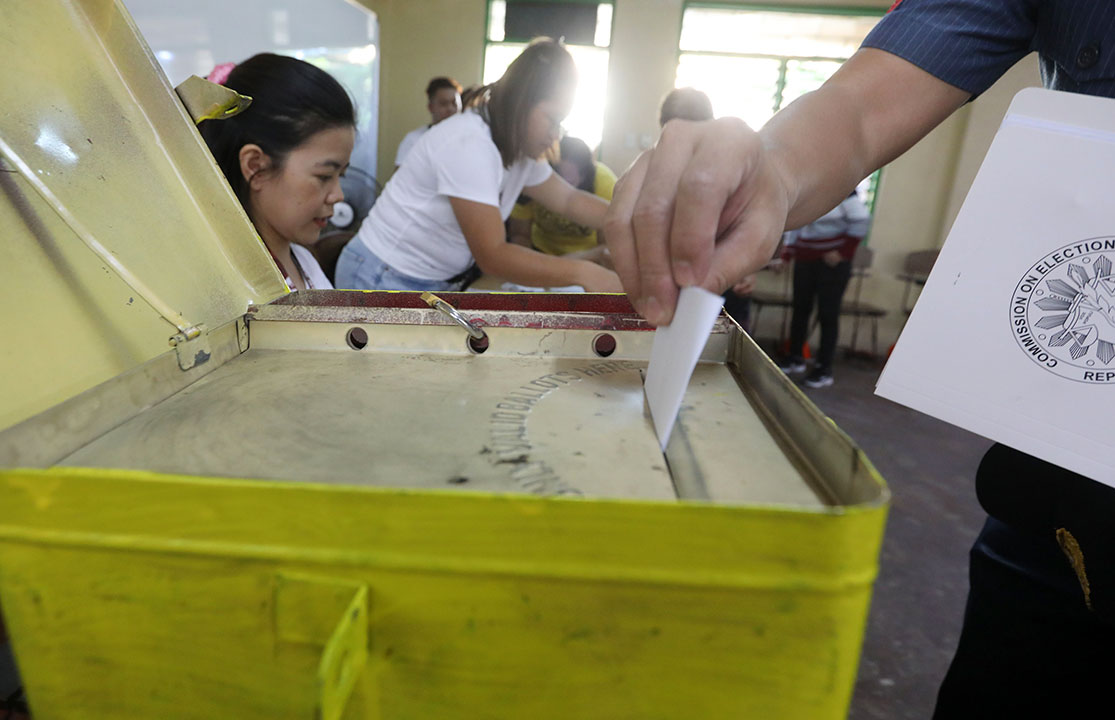
Upgrade to High-Speed Internet for only ₱1499/month!
Enjoy up to 100 Mbps fiber broadband, perfect for browsing, streaming, and gaming.
Visit Suniway.ph to learn
 PHILIPPINE STAR/EDD GUMBAN
PHILIPPINE STAR/EDD GUMBANBy Chloe Mari A. Hufana, Reporter
THE results of today’s midterm elections will not significantly disrupt President Ferdinand R. Marcos, Jr.’s economic agenda as the policy direction of the administration and “opposition” remain pro-business despite the widening Marcos-Duterte rift, an analyst said.
 “There is really no substantive disagreement between ‘administration’ and ‘opposition’ on the pro-business direction of policymaking because the elite-driven nature of the country’s politics and elections consistently marginalizes voices for genuinely alternative development policies,” IBON Foundation Executive Director Jose Enrique A. Africa said in a Viber chat.
“There is really no substantive disagreement between ‘administration’ and ‘opposition’ on the pro-business direction of policymaking because the elite-driven nature of the country’s politics and elections consistently marginalizes voices for genuinely alternative development policies,” IBON Foundation Executive Director Jose Enrique A. Africa said in a Viber chat.
“Regressive tax policies, opening up to foreign ownership, and infrastructure spending have long enjoyed support and been consistently advanced across administrations,” he added.
Mr. Africa noted that the continuity of these economic policies will not be significantly disrupted even if the administration’s position in Congress erodes.
“The real question isn’t legislative gridlock and whether these policies will be passed but whether they serve the broader public interest,” he noted. “Unfortunately, the narrowly pro-business orientation prevents substantive reforms on deeper issues of joblessness, informality and low incomes, of inequality, and of universal access to social services.
He further said that national industrialization, agrarian reform and rural development, and the improvement of public services are always sidelined in short-sighted and profit-oriented framework.
The 2025 Philippine midterm elections have become a battleground for two of the nation’s most influential political dynasties, the Marcoses and the Dutertes, whose once-solid alliance has turned into a bitter feud last year.
Mr. Marcos and Vice President Sara Duterte-Carpio, who secured victory in the 2022 elections under the “UniTeam” banner, are now leading opposing factions vying for control of Congress.
Despite frequent political shake-ups and factional clashes, the so-called political instability in the Philippines has little impact on the country’s economic policy direction, which remains firmly pro-business, Mr. Africa said.
The real threats to economic planning, he warned, lie not in shifting congressional alliances but in external shocks like potential disruptions from a second Donald J. Trump presidency, global supply chain realignments, and volatile food and energy prices, along with domestic structural issues such as weak job growth and stagnant family incomes tied to decades-long decline in agriculture and manufacturing
“Inflation, business growth, and long-term planning are probably more deeply affected by external shocks or by structural weaknesses in the domestic economy… Measured against these greater threats to long-term planning, the shifts in congressional alliances are a minor distraction at best,” he said.
2028 POLITICAL LANDSCAPE
The outcome of Monday’s elections, Gary D. Ador Dionisio, dean of the School of Diplomacy and Governance of De La Salle-College of St. Benilde, said will not only shape the legislative agenda for the remainder of Mr. Marcos’ term but also influence the political landscape leading up to the 2028 presidential race.
The outcomes of the polls today are a preview of the political configuration of the 2028 presidential elections, he noted.
“[The] 2025 midterm elections are not only a referendum of Marcos but also of Vice President Duterte because of the growing ‘affective polarization’ of their supporters and voters,” he said in a Facebook Messenger chat.
“However, since the 2025 election result is only a preview, and politics is the art of many possibilities, it’s up to the power holders in Malacañang how they will wield and yield their agenda, such as the impeachment, economic development, and maritime security, in the coming days and years,” he added.
Mr. Ador Dionisio said that while Marcos-backed bets seem to dominate heading into today, political consolidation will be sharpened once the impeachment court against Ms. Duterte starts and the opinion polls from the impeachment are released.
The Senate trial is scheduled to commence after today’s elections, which are expected to influence the political landscape and the outcome of the proceedings.
The rift between the two families widened following a series of events, including Ms. Duterte’s resignation as education secretary amid a congressional probe into her alleged misuse of funds and subsequent impeachment by the House of Representatives on charges ranging from constitutional violations to plotting against the president.
It further escalated with the arrest of former President Rodrigo R. Duterte in March under an International Criminal Court warrant for alleged crimes against humanity related to his bloody anti-drug campaign.
A majority of Mr. Marcos’ senatorial slate is poised to win, according to several surveys published leading up to the elections. While the Duterte-backed ones are trailing behind with only a few poised to win in the tight senatorial race to the Senate.
Political science lecturer at the Ateneo de Manila University, Hansley A. Juliano, said Filipino voters tend to elect leaders who resonate with their anxieties and speak their language.
“Candidates who resonate with the anxieties of our precarious population, who have demonstrated that they share the language and milieu of our unstable workforce, and who guarantee aid and assistance for them and their families (be it short- or long-term) — they are the ones who tend to win,” he said in a Facebook Messenger chat.
Mr. Juliano said programmatic and reform-oriented candidates must learn and execute how to translate their platforms.
“Otherwise, they’re forever seen as technocratic bores or patronizing know-it-alls,” he added. “Local elections and the victory of reform candidates already showed how it can be done, and it is frustrating that national candidates, parties, and party-list groups (especially the opposition) keep failing the assignment,” he noted.
Mr. Juliano said a victory for the administration slate means easier passage of laws and regulations.
“Especially if the Senate is more amicable/pliable to presidential interests, the way the much-controlled Lower House is,” he added, but noted that it is not always guaranteed.
“Senatorial dynamics and the desire to project independence mean there will be instances when the Senate majority may even make common cause with non-admin/opposition/wildcard senators to stall certain legislation.”
The vote will decide control of the 315-seat House of Representatives and half the 24-member Senate.
Meanwhile, the Commission on Elections (Comelec) earlier said they are fully prepared to cushion any problems that may arise during today’s voting.
The Philippine Army has deployed 16,489 personnel to support the Philippine National Police and the Comelec in maintaining security during the election period.
Voting today will be open from 5 a.m. to 7 p.m., with over 18,000 elective positions up for grabs nationwide.




